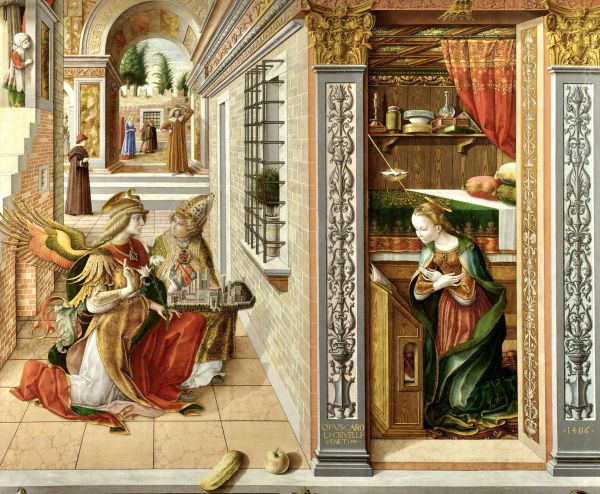The Annunciation illustrates the art of listening in Mary, visited by the Angel Gabriel. She accepts the Mystery but asks questions of meaning, using her intelligence, in humility and dignity.
After their conversion, Francis and Clare always sought God's will by looking to Mary, the handmaid of the Lord, the one who had found favour with the Almighty by becoming the Mother of Jesus.
From the very beginning of his vocation-mission, Francis paid special and devoted attention to the Virgin.
The Sources make us aware of the extraordinary love for Her, expressed in a hieratic antiphon of the Poverello:
"Holy Virgin Mary, there is none like thee, born in the world among women, daughter and handmaid of the most high King the heavenly Father, mother of our most holy Lord Jesus Christ, spouse of the Holy Spirit; pray for us with Saint Michael the Archangel and with all the powers of heaven and with all the saints, to thy most holy beloved Son, Lord and Master" (FF 281).
Francis "surrounded the Mother of Jesus with an unspeakable love, because she had made the Lord of majesty our brother" (FF 786).
But Clare herself, who was considered «altera Maria», when she arrived at the Portiuncula, where Francis and the brothers were waiting for her because of her total dedication to God:
"After she had taken the insignia of holy penance before the altar of St. Mary and, almost before the nuptial thalamus of the Virgin, the humble handmaid was married to Christ, immediately St. Francis led her to the church of St. Paul*, with the intention that she should remain there until the Will of the Most High disposed otherwise" (FF 3172).
Like Mary, Clare pronounced her 'Fiat' to the will of the Father:
«Behold the handmaid of the Lord: let it be to me according to thy word» (Lk 1:38).
Oh how they both loved God's will!
Forgetful of themselves they adhered to the divine plan for them, each in her own time, each in her own groove.
In the Sources again we find:
"In the same way, then, that the glorious Virgin of virgins bore Christ materially in her womb, you too, following his vestiges, especially his humility and poverty, can always, without any doubt, bear him spiritually in your chaste and virginal body. And thou shalt contain in thee Him by whom thou and all creatures are contained, and shalt possess that which is most lasting and final good even in comparison with all the other transient possessions of this world" (FF 2893 - Letter Three to Blessed Agnes of Prague).
Francis and Clare, following the example of the humble Mary of Nazareth, loved God's will for them in a sunny and lasting way.
In fact, in a concluding prayer of Francis, we contemplate his constant yearning to seek her and follow her with abandonment.
"Almighty, everlasting, just and merciful God, grant us wretches to do, by the power of your love, what we know that you want, and to always want what pleases you, so that, inwardly purified, inwardly enlightened and kindled by the fire of the Holy Spirit may we follow in the footsteps of your beloved Son, our Lord Jesus Christ, and, with the help of your grace alone, come to you, O Most High, who in perfect Trinity and simple Unity live and reign glorious, Almighty God for ever and ever. Amen" (FF 234 - Letter to the whole Order).
*The church and Benedictine monastery of San Paolo delle Abbadesse, where Clare was led after her consecration in the Portiuncula, stood near Bastìa Umbra, 4 km from Assisi.
Annunciation of the Lord (Lk 1:26-38)












